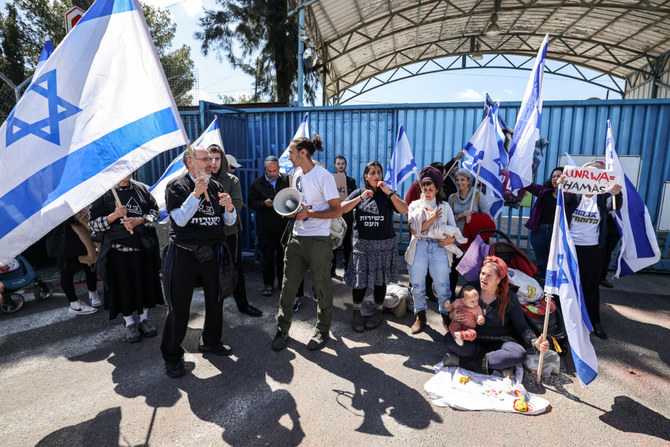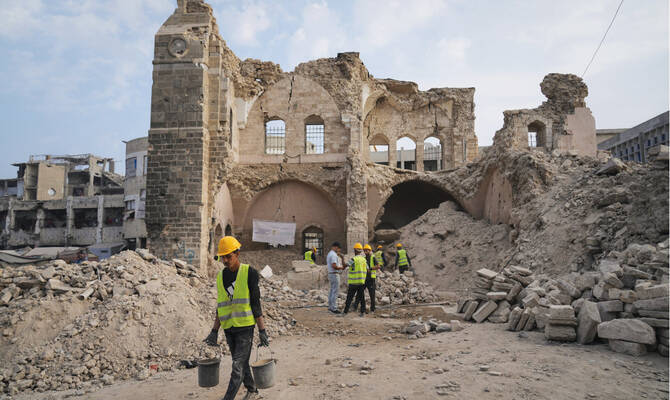LONDON: Israel has proposed to the UN the dismantlement of the UN Relief and Works Agency for Palestine Refugees, UNRWA, and suggested transitioning its responsibilities and staff to a new entity in exchange for allowing more food aid deliveries into Gaza, the Guardian reported on Sunday.
The proposal was presented by Israel’s Chief of the General Staff Lt. Gen. Herzi Halevi in discussions with UN officials in Israel earlier in March. These officials then relayed the proposal to UN Secretary-General Antonio Guterres on Saturday, sources familiar with the discussions told the Guardian.
UNRWA, the main humanitarian organization operating in the Palestinian territories since 1950, was not involved in the talks because the Israel Defense Forces have refused to deal with it. This is on the basis of unverified claims that some of the agency’s staff participated in the Oct. 7 attacks on Israel.
The IDF has yet to substantiate these claims, which have prompted a suspension of $450 million in funding from 16 major donors. This funding freeze comes at a critical time as Israel’s blockade is driving 2.3 million residents of Gaza to the brink of famine.
The proposal details the transition of 300 to 400 UNRWA staff to either an existing UN agency, like the World Food Programme, WFP, or a newly established organization focused on food distribution in Gaza.
The plan includes the eventual transfer of more UNRWA employees and assets, though it remains unclear who would manage the new entity or ensure the security of its operations.
Tamara Alrifai, the agency’s director of external relations, highlighted concerns that the proposed new entity’s limited scale would undermine effective aid distribution in Gaza, emphasizing UNRWA’s extensive infrastructure and human resource capabilities.
“This is no criticism of WFP, but logically if they were to start food distribution in Gaza tomorrow, they’re going to use UNRWA trucks and bring food into UNRWA warehouses, and then distribute food in or around UNRWA shelters,” she told the Guardian.
“So they’re going to need at a minimum the same infrastructure that we have, including the human resources.”
UNRWA is by far the largest aid organization in Gaza, employing 13,000 people when the war broke out, 3,000 of whom are still working. In addition to distributing food, the agency is a major employer in Gaza, providing education and critical medical services as the enclave’s healthcare system crumbles.
“It’s not just food. We have seven healthcare centers now running in Gaza, we give 23,000 consultations every day, and we have administered 53,000 vaccines since the war started. So that in itself is an entire field that no other agency right now can offer,” Alrifai said.
“It’s great that we’re focusing on food because of the famine, and we are raising the alarm about malnutrition, but UNRWA is so much more than food distribution.”
Some UN officials see the Israeli plan as an attempt to portray the UN as unwilling to cooperate if there is famine in Gaza, which humanitarian organizations have warned is impending.
Others in the UN, several aid agencies, and human rights organizations see the Israeli proposal as the result of a long-running campaign to eliminate UNRWA.
“If we allow this, it is the slippery slope to us being completely managed directly by the Israelis, and the UN directly being complicit in undermining UNRWA, which is not only the biggest aid provider but also the biggest bastion of anti-extremism in Gaza,” one UN official told the Guardian. “We would be playing into so many political agendas if we allowed this to happen.”
The US has privately endorsed Israel’s proposal to integrate the functions of UNRWA into other UN agencies. However, this initiative has faced opposition from various donors and UN Secretary-General Antonio Guterres, who has consistently supported UNRWA.
During a visit last week to a refugee camp in Jordan, Guterres emphasized the importance of UNRWA, adding that it would be “cruel and incomprehensible” to stop its services to Palestinians.
UNRWA’s authority and continuation are sanctioned by the UN General Assembly, which is the only body with the power to determine the agency’s destiny.
Several UN aid officials assert that only UNRWA has the resources and trust of ordinary Palestinians to deliver food aid to Gaza. And that attempting to create a new aid organization for political reasons in response to Israeli demands amid its relentless bombardment of Gaza would be disastrous.
“It is outrageous that UN agencies like WFP and senior UN officials are engaging in discussions about dismantling UNRWA,” former UNRWA spokesperson Chris Gunness told the Guardian. “The General Assembly gives UNRWA its mandate and only the General Assembly can change it, not the secretary-general and certainly not a single member state.”
















